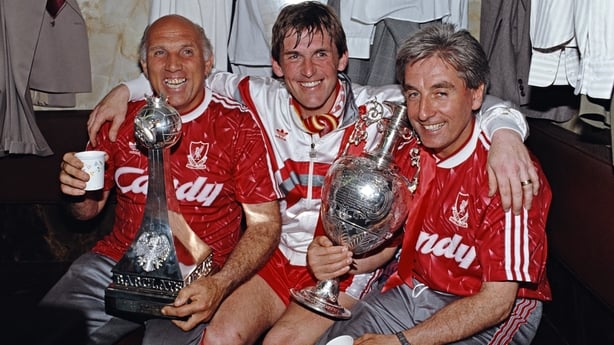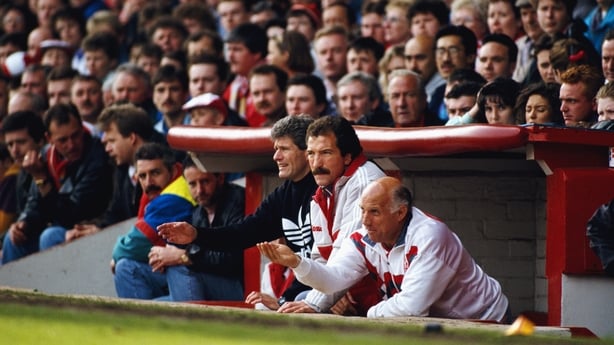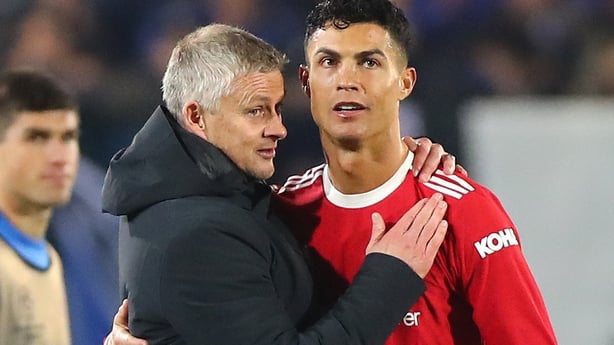There's a yin and yang to Liverpool and Manchester United.
England's two most successful clubs very rarely peak at the same time; just as the fortunes of one improves, the other plummets into an existential crisis.
In The Men In White Suits, Simon Hughes' excellent book chronicling Liverpool in the 1990s, John Scales recalls walking into a club obsessed with the old days.
The Reds had been a winning machine through the 70s and 80s but after Graeme Souness’ turbulent reign at the beginning of the decade, they turned to one of the old Boot Room Boys - Roy Evans - to steady the ship.
He instinctively leaned on the methods he’d learned under the tutelage of Bill Shankly, Bob Paisley and Joe Fagan.
But times had changed.
"The wooden target boards were still used and they were rotting away," remembered Scales. "There was no tactical or technical analysis."
With Liverpool fixated on the past, their more forward-thinking rivals raced away. Scales deduced that the club’s strong socialist principles, ingrained by the messianic Shankly, cost them during a decade of hyper capitalism in the game.
United in particular embraced the spectacular commercial boom that arrived after the establishment of the Premier League. They were two steps ahead of almost everyone else off the pitch, expanding Old Trafford and maximising commercial returns just as their team was entering a long period of consistent success. It was a potent mix.
Liverpool looked twee and provincial compared to the behemoth 32 miles down the M62.
It took the Merseysiders until the noughties to start catching up - and even then progress slow. In 2005, the day after their miraculous Champions League final win against AC Milan, fans flocked to Anfield to get their hands on some merchandise. The club shop was closed.

Roman Abramovich's arrival at Chelsea in 2003 tugged the English top-flight towards spending on an astronomical level and that curve has risen exponentially ever since.
Now, Gulf State-owned Manchester City and Newcastle United are setting standards that make Manchester United look like a dusty relic.
While Scales was taken back by Liverpool’s rickety old target boards in the 90s, United have allowed themselves to slide into comparable mediocrity in the 2020s.
Cristiano Ronaldo noted a lack of basic progress made when he returned to the club in 2021 after 12 years away.
"Nothing changed, surprisingly," he said last year. "Not only the pool, the jacuzzi, even the gym. Even the kitchen, the chefs, whom I appreciate - lovely people. They stopped in time. It surprised me a lot."
Go to Old Trafford on a rainy day and you better bring an umbrella. Fans' frustrations at poor performances are now being compounded by a stadium roof leakier than Erik ten Hag's defence.
Liverpool, in fairness, have been transformed as a commercial entity under the savvy stewardship of Fenway Sports Group, while on the pitch Jurgen Klopp’s men have won the big trophies thanks to innovative coaching and an excellent hit rate in the transfer market.
They gave sporting director Michael Edwards and FSG president Mike Gordon license to make the footballing calls, which was a relationship Klopp embraced. The pay-off was spectacular.
Edwards and Gordon are now gone from the club while Klopp's deal ends in 2026, when he also looks likely to walk away. That will be a monumental moment for Reds fans who've feasted on United's misery since Ferguson retired, but also remain keenly aware of the pitfalls of losing a supremely gifted figurehead.
A challenging crossroads awaits.
It's uncanny how the two giants shadow each other's mistakes.
On Merseyside in 1991, Dalglish made the shock decision to quit with Liverpool still in the hunt to win another title. The Scot had been breaking out in rashes and struggling to make in-game decisions as the trauma of the Hillsborough Disaster caught up on him; he simply couldn't endure the strain any longer.
Souness was the obvious choice to replace him. He'd been an outstanding captain for Liverpool during a golden period from the late 70s into the mid-80s, and had enjoyed considerable success at Rangers in his first foray into management.
But Souness proved to be a bad fit. He attempted to move older players on too quickly, and efforts to change training and dietary habits were stubbornly resisted.

"At Rangers, they bought into it because they were young boys," he would later recall. "So, then when I go to Liverpool and say, 'I don't want to see fish and chips after the game and I don't want to see lager under the seats on the bus for the way back', the response you would get would be, 'We have always done that'. It was very hard for me to argue that because I had been part of that culture. I made many mistakes and my biggest crime was trying to make the changes too quickly."
Twenty-five years after Souness took over at Anfield, United tried to realign themselves after the rocky tenures of David Moyes and, to a lesser extent, Louis van Gaal by bringing in serial winner Jose Mourinho.
In his first campaign, the Special One won the Europa League and League Cup. In his second, United finished a distant second in the league to Manchester City. Then the wheels came off.
For the entirety of his reign, Mourinho stayed at the five-star Lowry Hotel in Manchester, with his family remaining in London. He had a spectacular falling out with £100m signing Paul Pogba, publicly criticised Luke Shaw, Anthony Martial and Marcus Rashford, and regularly called out the ownership for not backing him in the transfer market.
A 3-1 defeat at Anfield in 2018 was the final nail in the coffin for Mourinho, who would later describe that second-place finish as one of his best achievements in the game.
Back to the 90s, and in the wake of Souness’ heavy-handed approach, Liverpool swung the other way. In came the genial Evans to nurture a crop of exciting young players that included Steve McManaman, Jamie Redknapp and Robbie Fowler. Evans won a League Cup but that was as good as it got as a talented side lacked the backbone to stand up to Alex Ferguson’s Manchester United juggernaut.
The infamous decision to wear white suits to the 1996 FA Cup final - which they lost to the Red Devils - would haunt the club for years. In another baffling error of judgement, the team bus down to Wembley was sponsored by The Emporium nightclub.
Tales of indiscipline would badly undermine Evans. Neil Ruddock’s admission that they’d play a game called 'Pass The Pound’ during matches was particularly damning. The player holding the coin at the final whistle paid for the drinks that night. A penny for Ronnie Moran's thoughts.
Liverpool fudged giving Evans the sack and instead brought in former France boss Gerard Houllier as a co-manager in 1998. It didn’t work. Within a few months a tearful Evans walked the plank, and Houllier remained.
Meanwhile, United went down a similar road after Mourinho scorched the earth and checked out of his swanky hotel for good.

Club legend Ole Gunnar Solskjaer arrived from Molde to put his arm around some heavy shoulders and soothe a few bruised egos. He made a remarkable start, winning 14 out of 19 matches to get the gig on a permanent basis.
Solskjaer made the players wear club suits before matches, just as his old boss Ferguson used to; he refused to park in Ferguson’s old spot in deference; and he never shied away from talking of the 1999 treble, as if he could somehow transfer the spirit of that truly great team to the current squad.
It didn't happen. Too many demons - not least the brooding Ronaldo, who seemed to unsettle the balance of the side despite chipping in with an impressive chunk of goals.
It's been reliably rocky ever since.
United keep taking a step forward and two or three back, locked in a civil war with their owners, the Glazer family, as they watch a carousel of managers go through the same routine of investment, improvement and then implosion. It's almost beyond belief that they remain without a sporting director.
Conversely, Liverpool look like they're back on track after a limp 2022/23 season. Klopp has them purring again having overhauled his midfield and polished up the wild, unpredictable Darwin Nunez. Time will tell if they yield more trophies in the German's era and - most crucially - stay at the top after he leaves.
There's every chance Liverpool could recede again as the tides of success ebb and flow, the only guaranteed insulation apparently coming in the form of Middle-Eastern owners with endless resources.
Otherwise these two old rivals, with nine European Cups and 39 league titles between them, will remain vulnerable to tumbling off the perch.


